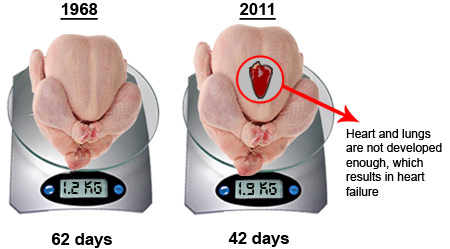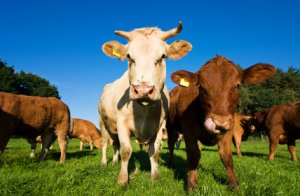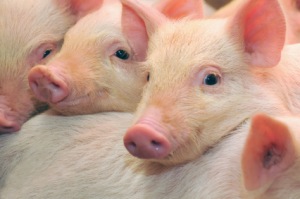An increasing number of people are asking questions about the food they buy: where does it come from, how has it been produced, how healthy is it really, does it contain antibiotics, growth hormones, pesticides or fertilisers, and how much abuse and suffering have animals had to endure for us to have food on our plates?
The cruel practices surrounding some of the “factory farming” (the mass production of livestock to provide food at lower costs to consumers) is a highly controversial and emotive topic between animal rights advocates, environmentalists, farmers and corporations. It is a particularly thorny issue for a country such as South Africa which has millions of starving people to feed.
The recent Supreme Poultry frozen chicken scandal (where it was revealed that old chicken had been injected with brine, repackaged and sold with a new expiry date; and some chickens reportedly had been treated with chlorine to reduce bacterial load) has not only highlighted the urgent need for improved food regulation and consumer protection, it also triggered a new interest in organic and free-range livestock.
SA’s main source of protein
For many South Africans, chicken forms an integral part of their diet. In fact, a total of one billion broiler chickens (chickens bred specifically for meat production) are raised in South Africa each year and around 18 million birds are slaughtered for their meat each week. In order to supply such a huge demand for meat, chickens are now genetically modified and pumped full of drugs to make them grow faster and larger.
According to Compassion in World Farming SA, in 1968 South Africa, broilers were slaughtered at 62 days, weighing 1.2kg. Today, they are slaughtered at 42 days, weighing 1.9kg. The birds grow so rapidly that their hearts and lungs are not developed well enough to support the remainder of the body, resulting in heart failure and tremendous death losses.
The chickens also become crippled because their legs can’t support the weight of their bodies. About one third of them suffer agonising ammonia burns on their feet as a result of spending their short six-week lives on faeces-saturated litter. Furthermore, they are in overcrowded conditions and in order to prevent them from pecking themselves and others their beaks are seared off.
'Battery hens'
The plight of commercial egg-laying hens, or so-called “battery hens” (hens confined in small battery cages for the duration of their short lives) looks no better. By 2012, the standard battery cages for laying hens will be banned for their cruelty throughout Europe. Yet, in South Africa, 22 million laying hens remain trapped in a space allowance of less than an A4 sheet of paper - for life. Currently only three percent of laying hens are free-range in South Africa.
Chicken may be the main source of protein consumed in South Africa, but the other livestock like cattle, sheep and pigs have not escaped the cruelties of factory farming.
It is true that free-range and organic farming are far more costly than conventional farming (more labour intensive, lower yields and higher risks) and that the technological advances in factory farming ensure a constant supply of affordable animal protein. However, even if animal welfare is of no concern to you, you should be worried about the quality of meat that you are consuming and the added growth-hormones, chemicals, pesticides and antibiotics, which could be harmful to your health.
No official legislation in SA
Identifying authentic free-range and organic produce in South Africa can be tricky for consumers, as there is no official legislation in place for free-range or organic farming in South Africa.
Says Kevin Lovell, CEO of the South African Poultry Association (Sapa): “’Free-range’ as a poultry concept is not currently fully covered by law in South Africa. There is a limited form of control through the current egg packing regulations under the control of the Department of Agriculture, Forestry and Fisheries (DAFF). The DAFF is however very close to finalising a set of free-range regulations for both eggs and poultry meat. We have had an opportunity to make inputs into these regulations as have the National SPCA and other interested bodies. They are based on the UK Freedom Foods system and carry our full support.”
Lovell explains that Sapa members currently have to conform to the Sapa Code of Practice (CoP) which specifies what constitutes “free-range” in reasonable detail. “This CoP is being updated and the new version, with some amendments to the ‘free-range’ requirements will hopefully become effective this year. Once the State publishes its regulations they will supersede our CoP as we do not have the force of law. For our customers who set their own standards [such as Woolworths] their private standards cannot be lower than that set by the State but may be higher.”
When it comes to “organic” the waters are a bit murkier than with “free-range”, as there are multiple definitions of the term “organic”, says Lovell.
At present the South African law governing organic farming is still in draft form. According to Lovell, DAFF is busy with regulations in this regard but it might be some time before these are promulgated. “In the interim there are only the private standards of the various organic certifying bodies.” These certifying bodies mostly adhere to European Union requirements to certify South African organic farmers.
What is the difference between organic and free-range?
All organic animals are free-range, however all free-range animals are not necessarily organic. All free-range animals live natural lives, roaming on the land, interacting with one another and eating only plant-based foods. However, animals classified as free-range, not organic, may be treated by conventional veterinary methods when sick. In addition, while free-range animals eat only plant-based foods, these are not necessarily organically produced, and may include approved artificial additives.
According to Jeanne Groenewald, the owner of Elgin Free Range Chickens (the largest independent free-range chicken farming operation in South Africa), “free-range” doesn’t necessarily mean drug-free. “The use of antibiotics is common practice in farming, because it’s an easy option and delivers excellent results.
“My chickens are drug-free, we use no antibiotics, but if we do get a sick chicken, we will medicate with assistance of a consulting vet and withdraw medicine at least 10 days before slaughter – the normal standard is 5 days, we double it!”
Free-range also does not always mean that the animal has been in an open area its whole life. It may only mean they were in a restricted area and let out into that open area at one time during their life.
“We believe in humane farming practices,” says Groenewald. “Our pasture-raised chickens roam freely on farms where they are free to express virtually all their natural behaviours. And just as nature intended, you won't find any animal by-products, antibiotics or growth promoters in any of our chickens.”
According to Groenewald the only way to see whether animals are treated humanely is to visit the farm. “I have no problem showing guests around on our farm, but there is no way that commercial farms will let visitors in. If you don’t want someone on your farm, what are you hiding?”
Definition of free-range
The first free-range eggs were introduced onto the shelves of Pick ‘n Pay and Woolworths in 1991, and in 2004 Woolworths banned all battery eggs from its shelves. Eggs that are not labelled “free-range” or “barn” are from caged hens.
It is important to note that free-range eggs from pastured chickens are quite different in terms of their egg yolk colour and egg shell strength. Chicken eggs are also much more nutritious when the poultry are able to run around outside eating plenty of bugs and grass versus eggs from confined grain fed chickens.
The first free-range broiler (meat) chickens became available in supermarkets in 2004 and in 2007 Pick ‘n Pay were the first supermarket to launch free-range pork. (In South Africa, 2.1 million breeding sows remain confined in metal cages preventing any movement forwards, backwards or sideways, and their piglets are reared in barren sheds on factory farms – eventually becoming our ham and bacon.)
Woolworths defines “free-range” as livestock that has the freedom to roam the outdoors (e.g. in free-range egg production, the hen is not kept in a cage) and that is housed in a barn with openings allowing free animal movement.
Definition of organic
In 1991, Woolworths were the first SA retailer to stock various fruit and vegetable ranges. Soon after they introduced organic meat (such as various beef and lamb cuts) and a range of organic dairy products.
“Organic would imply that not only are the animals reared on pasture that has no pesticides etc but in addition, the food given to the animals has been grown in pesticide-free conditions and without unnatural chemical pesticides and growth promoting agents in the soil,” says SA representative for Compassion in World Farming, Louise van der Merwe.
Woolworths add: “Organic livestock are fed a diet consisting of certified organic feed, accommodated in a free-range manner with free access to the outdoors and treated only with approved homoeopathic remedies.”
What is the difference between grain-fed and grass-fed?
There’s a lot of confusion surrounding grass-fed vs. grain-fed. Grass-fed animals live in pastures rather than feedlots. “Grass-fed” or “pasture-raised” often means that animals were likely raised without the use of antibiotics and hormones. Also, their feed is typically not made with animal by-products.
Animals raised in feedlots are fed diets specifically designed to fatten them up as quick and as cheap as possible. The main feed that non-organic, non-grass-fed animals get is genetically modified grain and soy.
Most South African beef is grain-fed, which means the cows are grass-fed for a short time (differing from producer to producer) then moved into feedlots. The cow's alkaline digestive system is naturally suited to grass whereas the unnatural corn diet negatively affects the cow's digestive system, making frequent use of antibiotics unavoidable.
Also, synthetic growth hormone is given to most (though not all) grain-fed cows to reach slaughter weight faster, whereas cows are given hormones to increase their milk supply.
While antibiotics are occasionally needed by grass-fed cows, this beef has been shown to be nutritionally superior to grain-fed. It has less total fat, higher levels of heart-healthy omega-3 fatty acids and higher levels of another type of fat, called conjugated linoleic acid, which is thought to reduce heart disease and cancer risks.
Conclusion: what should you do?
Many retailers do not ask for a thorough authentication programme before taking on a supplier and many shops could at any given time have unproven product on their shelves.It is important to check whether your retailer has an authentication programme in place and that their suppliers are externally audited on a regular basis. It is also important to check whether their products are free of antibiotics and hormones.
Empower yourself by asking the right questions from your retailer and demanding satisfying answers. Also check out the farmers’ markets and local suppliers in your area. Soon, in April 2011, the Consumer Protection Act will kick in, which will give South African consumers the power to challenge suppliers and farming practices. However, it will only be effective if consumers are proactive and demand transparency about the way that their food was produced.
(Sources: http://www.ciwf.org.uk; www.mayoclinic.com; www.freerangechickens.co.za; www.woolworths.co.za; www.HealthCastle.com; www.animal-voice.org, http://www.woolworthsholdings.co.za/, http://www.thedailygreen.com; www.sapoultry.co.za; www.bbc.co.uk)




 Publications
Publications
 Partners
Partners










